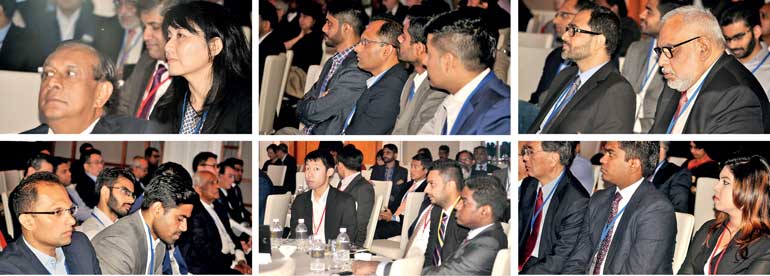Tuesday Feb 24, 2026
Tuesday Feb 24, 2026
Monday, 12 March 2018 00:00 - - {{hitsCtrl.values.hits}}
Text and Pix by Nisthar Cassim

Sri Lanka Inc recently made a compelling case to woo more portfolio and direct investments from companies and funds based in Singapore.
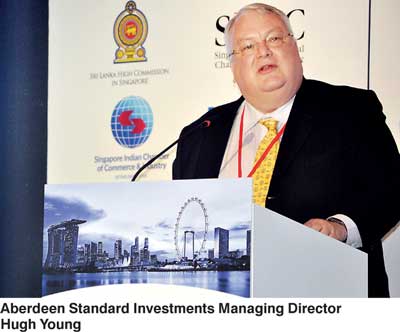
The platform used for this successful exercise was the Invest Sri Lanka Forum organised by the Colombo Stock Exchange in partnership with and with support from multiple organisations both in Sri Lanka and Singapore.
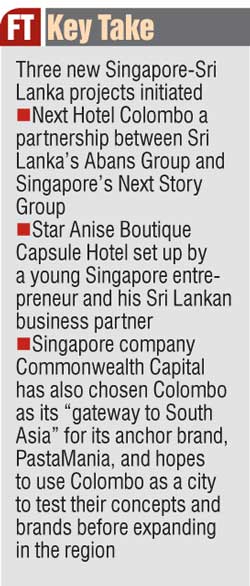
Over 350 companies, investors and fund managers based in the city-state attended the forum at which Prime Minister Ranil Wickremesinghe was the Chief Guest and Singapore’s Minister of Trade and Industry S. Iswaran was the Guest of Honour.
The Forum was timely with Sri Lanka and Singapore signing a landmark Free Trade Agreement in January. This, along with an improved outlook for foreign portfolio investments in Sri Lanka as well as the economy owing to widening cooperation with the rest of the world, were key reasons for the record participation at the Forum.
Given the importance of Singapore as a trading, investment and technology partner,over 60 Sri Lankan business leaders and executives were present at the forum. They were from John Keells Holdings Plc, Commercial Bank Plc, HNB Plc, HayleysPlc, Hemas Holdings Plc, Sampath Bank Plc, DFCC Plc, NDB Plc, Access Engineering Plc, Tokyo Cement Lanka Plc, Seylan Bank Plc, Lion Brewery Plc, LAUGFS Gas Plc, Singer Sri Lanka Plc, Softlogic Holdings Plc, Sunshine Holdings Plc and Walkers CML and leading stockbroking firms.
The listed companies had several one-on-one meetings with a number of leading international and Asian institutional frontier market focused funds and other investors keen on discussing the investment opportunities available in Sri Lankan listed companies.
The Securities and Exchange Commission of Sri Lanka and the Sri Lanka-Singapore Business Association were the co-organisers of the event. The Singapore Business Federation was the Strategic Partner.
The forum also featured an impressive line-up of international and Lankan experts as speakers and panellists. They included Central Bank Governor Dr. Indrajit Coomaraswamy, Sri Lanka’s High Commissioner in Singapore Nimal Weeraratne, CSE Chairman Ray Abeywardena, CEO Rajeeva Bandaranaike, SEC Director General Vajira Wijegunawardane, Aberdeen Standard Investments Managing Director Hugh Young, CHEC Port City Colombo Chief Sales and Marketing Officer Liang Thow Ming, Kuok (Singapore) Ltd. Chairman Kuok KhoonEan, DBS Group Research MD and Chief Economist TaimurBaig, Softlogic Holdings Head of Investments Niloo Jayatilake, Singapore-Sri Lanka Business Association President Angelo Perera and Singapore Business Federation Honorary Secretary Lawrence Leow.
Institute of Policy Studies in Sri Lanka Chairman Dr. Razeen Sally moderated a panel focussing on the economy and capital market prospects.Prime Minister Wickremesinghe also took part in a Q&A session with Rob Ioannou, Managing Director and Head of International at DBS Private Bank.
PM urges Singapore to invest in Sri Lanka and be part of new growth story
In his keynote, Prime Minister Wickremesinghe urged Singaporeans and fund managers based in the city-state to invest in Sri Lanka and be part of the new growth story in the Indian Ocean.
“We will make Sri Lanka a strong, stable and resilient economy, and an attractive place to do business. We encourage you to come and invest in Sri Lanka now – as an early mover – and be a part of the new growth story playing out in the Indian Ocean,” the Premier told the forum.
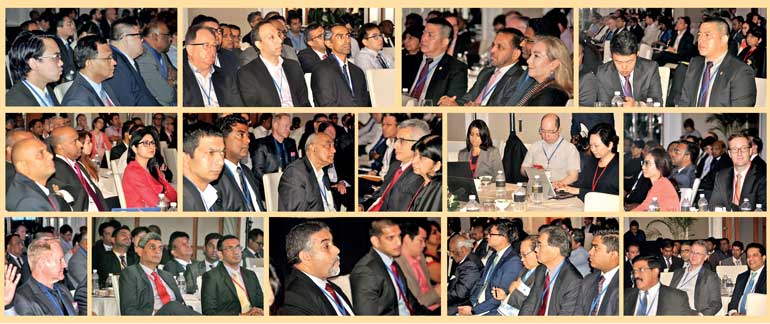
Wickremesinghe said Sri Lanka is on the path of becoming an attractive place for business in South Asia, one of the fastest growing regions of the world.
Furthermore, the ongoing global economic power rebalancing is resulting in the Indian Ocean becoming a centre of economic gravity. This in turn enables us to leverage on our strategic location to become a hub of the Indian Ocean by building on our good relations with the key economies. We have accepted the concept of a ‘Free and Open Indo-Pacific Policy and Maritime Order’ proposed by Japan. We play a crucial role in India’s ‘Neighbourhood First’ policy. We are also an important linchpin in China’s Belt and Road Initiative, particularly the maritime route connecting East Asia with Africa. Sri Lanka as an island is increasingly becoming a vital player in this region, enabling us to punch above our weight. A lesson we have learnt from Singapore. This also means that for you – in Singapore – Sri Lanka becomes a very advantageous hub to do business, to live, to invest in, to use as a springboard to South Asia and the Indian Ocean region, and as a link between South East Asia and South Asia.
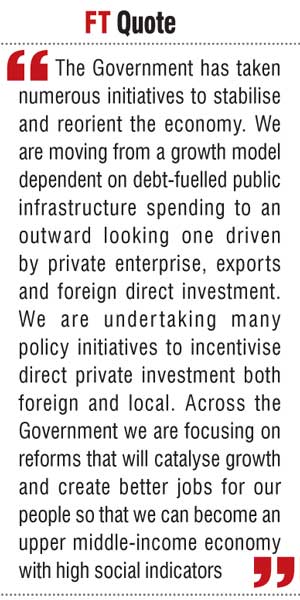
According to the World Bank’s South Asia Economic Focus “advanced economies are recovering and are seeing faster growth that will likely increase the demand for South Asian products. The region should seize this opportunity to diversify its exports and enhance its supply response”.Sri Lanka is following a similar strategy. Hence our Government has taken numerous initiatives to stabilise and reorient the economy. We are moving from a growth model dependent on debt-fuelled public infrastructure spending, to an outward looking one driven by private enterprise, exports, and foreign direct investment. Across the Government we are focusing on reforms that will catalyse growth and create better jobs for our people, so that we can become an upper middle-income economy with high social indicators.
We envision Sri Lanka becoming a knowledge-based, highly competitive economy at the hub of the Indian Ocean. To achieve this, we will need to move our manufacturing and services up the value chain. We need to increase export earnings to create a favorable balance of trade. This means that as a country, we must have better financing, cutting-edge technology, and improved market access. Therefore, our Government knows that attracting foreign investment is a key priority.
We are undertaking many policy initiatives to incentivise direct private investment,both foreign and local. In 2018 you will see the results of our commitment to improving the ease of doing business. By mid-2018, the time taken to register a new business will reduce from six days to just one day. Finding land and registering property will be halved from 51 days to 26 days, and the procedures reduced from nine steps to two steps. We are introducing an ‘Electronic Single Window’ which will link dozens of state agencies dealing with international trade through a few clicks. Through the new Colombo International Financial City, the present Port City project, we are creating a unique business climate that is globally-competitive. This new city will function as a special economic zone and have a conducive and transparent regulatory system. It will provide an environment for your companies like no other in this region.The enabling legislation is now in the preparatory stage. We plan to launch the gallery mid this year – you should visit.
The Government is complementing these efforts with comprehensive trade policy reforms. The recent budget removed protectionist para-tariffs on over 1,200 items, with the rest slated for removal in 2018 and 2019. We know we can leverage on our strategic location to expand market access. Therefore, we are expanding our trade and investment relationships with a diverse set of countries, such as the US, EU, India, China, Singapore, Japan, Malaysia, Thailand and Indonesia.
During your Prime Minister’s visit in January, our two countries signed a landmark Free Trade Agreement. This was the first trade agreement that Sri Lanka forged in over 10 years. It is also Sri Lanka’s first comprehensive FTA, which goes beyond goods to include services, investment, e-commerce, government procurement, 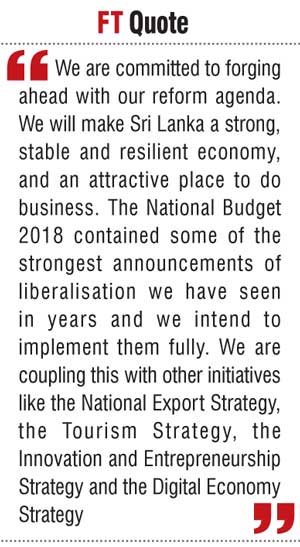 telecommunications, financial services and economic cooperation. To have done our first comprehensive agreement with Singapore – one of the most open and liberalised economies in the worldhaving high-quality institutions – is an especially important milestone for our country. It signals our Government’s commitment to ushering in an era of openness for Sri Lanka – an era of close trade integration that enables us to become a formidable economic hub in the Indian Ocean.
telecommunications, financial services and economic cooperation. To have done our first comprehensive agreement with Singapore – one of the most open and liberalised economies in the worldhaving high-quality institutions – is an especially important milestone for our country. It signals our Government’s commitment to ushering in an era of openness for Sri Lanka – an era of close trade integration that enables us to become a formidable economic hub in the Indian Ocean.
The Singapore-Sri Lanka FTA is part of a broader strategy of looking east to renew our trade relationships. While we focus on growing and sustaining our traditional markets of the US and Europe, we have begun to diversify our markets towards Asia and focus on plugging into Asian supply chains. This FTA is our first agreement with a South East Asian country – and we envisage this as a first step towards closer integration with the Regional Comprehensive Economic Partnership Agreement.
We are close to concluding two more bilateral trade agreements:
(a) An Economic and Technology Cooperation Agreement with India deepening the existing FTA and
(b) A comprehensive FTA with China.
These agreements are an important part of the new ‘National Trade Policy’ launched last year and are a linchpin in the ongoing trade policy reforms. They will add on to the advantage created by our access to the EU’s GSP+ facility. This means that through our preferential market access, any business located in Sri Lanka would be able to access nearly three billion people from Spain to China - we are probably one of the very few countries in the world that can claim this!
This only adds on to our strategic geographical advantages – we are one hour from five fast-growing South Indian states, have quick access to the Bay of Bengal region and are only a few hours from South East Asia and the Middle East.
With our excellent strategic location, we are also attracting Belt and Road projects from China. We expect a lot of investor interest in the new Logistics and Industrial Zones near the southern port of Hambantota, which is being developed with Chinese investment.
Three other large industrial zones are being set up, including one in partnership with a private investor from Thailand. We also expect to develop tourist zones and domestic airports across the country to facilitate the booming tourism industry. The major tourist resorts which are available to private developers will each be over 500 acres in extent, larger than many tourist island resorts in the region. Our Government is developing Sri Lanka’s three large ports and two international airports and improving domestic connectivity and infrastructure. A key initiative on this front will be a highway connecting Hambantota in the South, Colombo and Kandy in the centre of the country, and this will open up new corridors of economic dynamism - A highly developed economic infrastructure system connecting two ports, two international airports, three major cities.
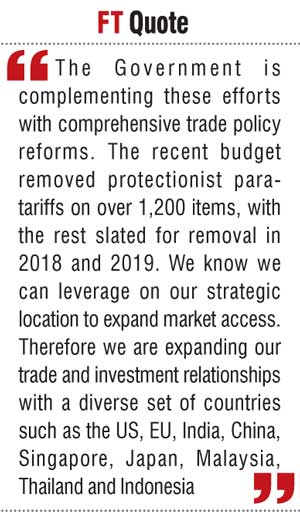
Finally – and probably most importantly for you – on the macroeconomic front: When we took over the economy in 2015, we had a challenging task on our hands. National debt had been mismanaged and fiscal and monetary policy lacked discipline. Since then we have taken appropriate measures to build back our economy’s strength and resilience. We are veryfocused on fiscal consolidation and the results are already visible – the tax to GDP ratio has improved and ratings agencies are providing favourable outlooks. Next month a new Inland Revenue Act will come into effect, providing a progressive, modern, and transparent income tax policy.
The tax incentives regime is now firmly written into the law and is based on investment allowances. The top rate of income tax is now lower than many countries in the region. Other revenue initiatives – VAT reforms, predictability in tax incentives, digitisation of revenue administration – are all part of the fiscal reforms we have embarked on, guided by the ongoing IMF program. The Exchange Control Act has been replaced by a new Foreign Exchange Act.The forecast for the ‘Sri Lanka Economy 2018’ states amongst others that merchandise exports are anticipated to grow by 10.7%
On monetary policy, the Central Bank has moved towards a more competitive exchange rate and a proactive monetary policy stance and is avoiding ‘stop-go’ cycles leading to instability. The Central Bank is now being recognised for providing a lot more clarity and certainty to the business community. You will no doubt hear more about our economy from the Governor of Central Bank of Sri Lanka who will be speaking later on in the program.
As I wrap up, let me reiterate that we are committed to forging ahead with our reform agenda. We will make Sri Lanka a strong, stable and resilient economy, and an attractive place to do business. The National Budget 2018 contained some of the strongest announcements of liberalisation we have seen in years and we intend to implement them fully. We are coupling this with other initiatives like the National Export Strategy, the Tourism Strategy, the Innovation and Entrepreneurship Strategy and the Digital Economy Strategy.
We encourage you to come and invest in Sri Lanka now – as an early mover – and be a part of the new growth story playing out in the Indian Ocean!
Iswaran says Sri Lankan companies can start their internationalisation journey via Singapore
Singapore’s Minister of Trade and Industry S. Iswaran in his speech emphasised the benefits of the FTA signed with Sri Lanka as well as how Sri Lankan companies can be successful in their internationalisation journey via Singapore. 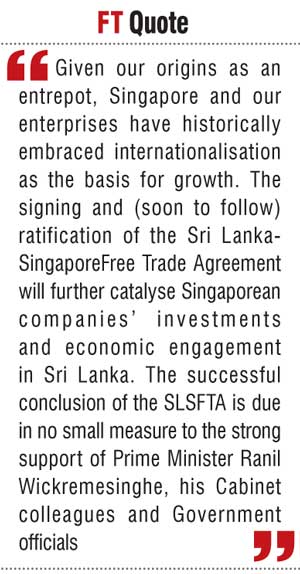
He said Sri Lanka and Singapore have had a busy two years and many bilateral engagements which culminated in the signing of the Sri Lanka-Singapore Free Trade Agreement when Singapore’s Prime Minister Lee HsienLoong visited Colombo on 23 January 2018.
The Sri Lanka-Singapore Free Trade Agreement is significant for both countries. As Sri Lanka’s first comprehensive bilateral free trade agreement, it is a clear demonstration of the Sri Lankan Government’s commitment to reintegrate into the global economy and bring more economic opportunities for its businesses and the people of Sri Lanka. For Singapore, this agreement marks another step forward in our commitment to free and open markets, and to deepening our bilateral ties with Sri Lanka, and through Sri Lanka into the South Asian region.
Given our origins as an entrepot, Singapore and our enterprises have historically embraced internationalisation as the basis for growth. The signing and (soon to follow) ratification of the Sri Lanka-Singapore Free Trade Agreement will further catalyse Singapore companies’ investments and economic engagement in Sri Lanka. The successful conclusion of the SLSFTA is due in no small measure to the strong support of Prime Minister Ranil Wickremesinghe, his Cabinet colleagues and Government officials.
We are already starting to see the benefits of the Sri Lanka-Singapore Free Trade Agreement – the positive news surrounding the agreement has led to an uptick in interest from Singapore companies to partner Sri Lankan companies to invest in opportunities both within Sri Lanka and to use Sri Lanka as a hub to expand into the broader South Asian region. Indeed, the strong turnout to this conference is testimony to the growing interest in opportunities in Sri Lanka.
When I was in Colombo in January, I had the opportunity to inaugurate two projects – one was the Next Hotel Colombo, a partnership between Sri Lanka’s Abans Group and Singapore’s Next Story Group; and the other was Star Anise Boutique Capsule Hotel, set up by a young Singapore entrepreneur and his Sri Lankan business partner.
Another Singapore company, Commonwealth Capital, has also chosen Colombo as its “gateway to South Asia” for its anchor brand, PastaMania, and hopes to use Colombo as a city to test-bed their concepts and brands before expanding into the region.
These new investments are taking place in diverse sectors and they represent new opportunities for the business community in Sri Lanka to work with their Singaporean counterparts, and also new job opportunities for Sri Lankans as Singapore companies seek a sustainable pool of talent to grow in-market and beyond.
Sri Lanka companies can also tap into the Sri Lanka-Singapore Free Trade Agreement to begin their internationalisation journey in Singapore. Singapore is connected to the Southeast Asian region through the ASEAN Economic Community, and many other international trading partners through our network of bilateral, regional and multilateral trade and investment agreements. These agreements would be beneficial to Sri Lankan companies wishing to explore new export markets for their goods and services, just as Singapore companies have tapped into Sri Lanka’s economic links with the countries in South Asia.
For the companies interested in research and development or test-bedding their solutions for the Southeast Asian region, Singapore also has a wide range of research institutes which will be able to value-add in several areas, and various regulatory sandboxes for the trialing of new ideas. One example would be in textile technology with textiles being one of Sri Lanka’s export and manufacturing strengths.
Today’s forum, co-organised by the Sri Lanka Business Association in Singapore and the Colombo Stock Exchange, is timely as it comes in the wake of the signing of the Sri Lanka-Singapore Free Trade Agreement.
The distinguished presence of Prime Minister Ranil Wickremesinghe is a unique opportunity to gain a deep and nuanced understanding of Sri Lanka and its economic direction.I urge all participants to make full use of this valuable opportunity to seek new opportunities and forge new partnerships.
CSE Chief says Invest SL Forum in Singapore timely to pursue new avenues for trade, investment and mutually beneficial partnerships
Colombo Stock Exchange Chairman Ray Abeywardena said that the Invest Sri Lanka Forum was timely as it came at a time when Sri Lanka and Singapore are pursuing new avenues for trade, investment and mutually-beneficial partnerships.
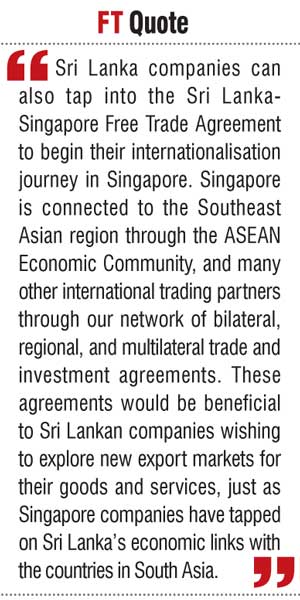
He said that the CSE and the SEC have collaborated over a period of time to promote investments in Sri Lankan capital markets and to showcase investment opportunities in leading Sri Lankan listed companies to foreign investors through the Invest Sri Lanka event series.
“These forums have built a strong investment case for Sri Lanka in many leading global financial centres and have served as a catalyst to source foreign investments from the UK, USA, Singapore, Australia, Switzerland and Hong Kong,” he said.
According to Abeywardena, the decision to select Singapore to hold this Invest Sri Lanka Forum was an easy one to make given that economic relations between Singapore and Sri Lanka have reached new heights in 2018.
Contd. on Page 14
New avenues for collaboration have been initiated and the Singapore-Sri Lanka FTA signed earlier this year has paved the way for a new era of economic and business cooperation, he said.
“We are confident that this new and improved backdrop of cooperation will strengthen economic ties and facilitate greater investment flows between our two nations,” CSE Chief added.
Highlighting the progress of the Colombo stock market, Abeywardena said CSE entered 2018 on the back of a record year of foreign investments into Sri Lanka.
“Foreign investments into the capital markets exceeded Rs. 112 billion in 2017, which is the highest ever recorded in our history, which is a strong endorsement of the value proposition the stock market offers. Sri Lanka is presently perceived as one of the most attractive frontier markets and the proposition is only getting stronger with solid macroeconomic reforms initiated for the country to gain momentum in its economic growth,” CSE Chief emphasised.
He said that the CSE, with the direction of the Securities and Exchange Commission of Sri Lanka, plays an integral part of this growth trajectory.
“The introduction of a multi-currency board to facilitate listings and trading in foreign currencies, the establishment of a delivery vs. payment framework, introduction of new products such as exchange traded funds, structured warrants, REITS and equity-linked derivative products, will broaden the range of products we offer and will improve our visibility globally. We are also focused on making substantial improvements to market infrastructure and risk management, to diversify and broaden our product range, enhance our governance structure and increase market access,” Abyewardena said. adding that “the CSE is committed to carrying out our tasks in communicating the investment potential that Sri Lanka offers to the world.”
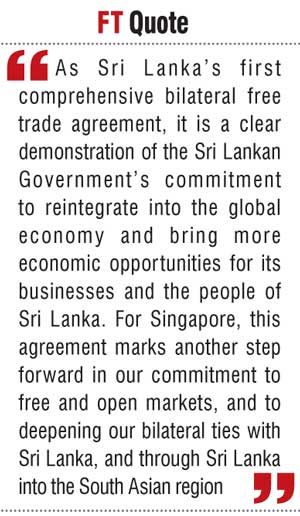
Central Bank Chief says measured and cautious optimism on economy
FT Quotes
Sri Lanka is on the cusp of a higher growth and development trajectory
If the Government is able to persist with theprogress made so far in fiscal consolidation we will have a new era for the Sri Lankan economy with strong macroeconomic fundamentals
Central Bank Governor Dr. IndrajitCoomaraswamy in his presentation said the headline message was “there is cause for measured and cautious optimism on the economy. Stabilisation of the economy has been achieved but it is not a euphoria moment and there is no cause for complacency.”
He presented several macroeconomic indicators to prove that the economy was stabilizing, leading the way for an upturn going forward. He highlighted a host of measures put in place during the past two years, especially after the IMF program was initiated and the results are evident.
He said that headline inflation in February was 4.5%, which was well within the target, and core inflation was at 3.5% and the latter has been within the 4-6% target in recent quarters. Headline inflation did reach a peak due to volatile prices over which monetary policy has very limited influence. He said three consecutive cultivation seasons were impact by adverse weather which pushed food price inflation to a high level of 14%. However, now the supply situation has improved which should bring down food price inflation and headline inflation.
He said monetary policy has had a tight bias over the past 18 months and he expressed hope that there will be room for a loosening. Overall, the balance of payments surplus was $ 2 billion, with external reserves improved to almost $8 billion. The build-up of volume has been buttressed by an improvement in quality, he said, pointing to improved stability on external reserves.
“Stability alone doesn’t win elections so we need to see how one can translate this favourable environment into a higher growth trajectory,” he told the Singapore forum.
In that regard he said there were some positive signs. He stated that last year exports and Foreign Direct Investments and Foreign Institutional Investments into the CSE rose to record levels though from a lower base.
In January the Central Bank-conducted Business Outlook Survey moved to positive territory for the first time after many quarters which means even the domestic sentiment is beginning to improve.
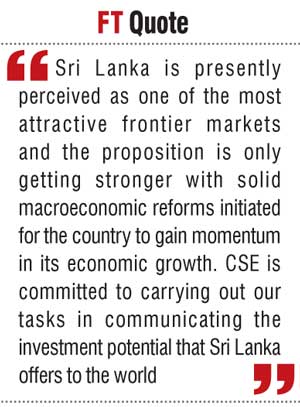
“All these means Sri Lanka is on the cusp of a higher growth and development trajectory,” the CB Chief emphasized, adding that the country needed to sustain the good things it has been doing during the past two years.
As part of consolidating the effort, the Government has put in place several clear frameworks for macro-economic management.
One is the aggressive revenue enhancement driven fiscal consolidation initiative. For the first time since 1953 there was a primary surplus in the Government Budget last year and for the first time since 1987 we expect a current account surplus in the Budget in 2017. These are structural problems that were there for many years with reckless fiscal spending and are being resolved.
“If the Government is able to persist with the progress made so far in fiscal consolidation, we will have a new era for the Sri Lankan economy with strong macroeconomic fundamentals,” Dr. Coomaraswamy said.
The Central Bank is also encouraging the Government to give teeth to the Fiscal Responsibility Management Act which sets overall targets on the Budget deficit and public debt to GDP.
On the monetary policy side, the Central Bank will be introducing a flexible inflation targeting regime and amending the Monetary Law Act and moving towards a more data-driven forward-looking monetary policy and market-oriented exchange rate policy and rules-based and transparent macroeconomic policymaking. The other is the proactive and prudent debt management given the high debt to GDP ratio with the Active (Debt) Liability Management Act.
He also detailed the Government’s trade tariff reforms, trade facilitation and expansion initiatives with planned FTAs and agreements to enhance economic cooperation, thereby harnessing the full potential of a strategic location to plug into the Asian supply chain. “Sri Lanka will be the only country in the world with preferential trade access to India, China and the Europe,” the CB Chief added. 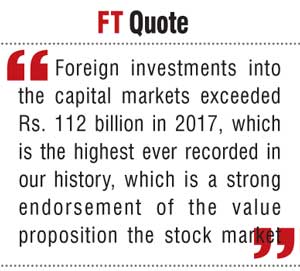
Singapore’s decision to enter into FTA with Sri Lanka reflects the Singapore Government’s confidence in Sri Lanka and its future - High Commissioner Weeraratne
Sri Lanka’s High Commissioner in Singapore NimalWeeraratne said the forum was important to further the strong bilateral ties between Sri Lanka and Singapore and the timing was ideal, especially after the signing of the FTA between the two countries.
“Singapore’s decision to enter into an FTA with Sri Lanka reflects the Singapore Government’s confidence in Sri Lanka and its future,” he said. Weeraratne also expressed confidence that the forum would result in many positive takeaways for both Singapore and Sri Lanka and their business communities, and open opportunities to further their engagements.
The Invest Sri Lanka Forum in Singapore was supported by a host of organisations. DBS Private Bank Singapore, Capital Alliance Partners, Wilmar International Ltd andBP de Silva Holdings as Platinum Sponsors. Acuity Partners, Asia Securities, Ceylon Guardian and CT CLSA Securities as Gold Sponsors.The Dwellings Group as Bronze Sponsorand the Oxford Business Group as the Exclusive Publication Partner. The Sri Lankan High Commission in Singapore, the Singapore International Chamber of Commerce, the Singapore Indian Chamber of Commerce and International Chamber of Commerce Sri Lanka were Promotional Partners of the initiative.
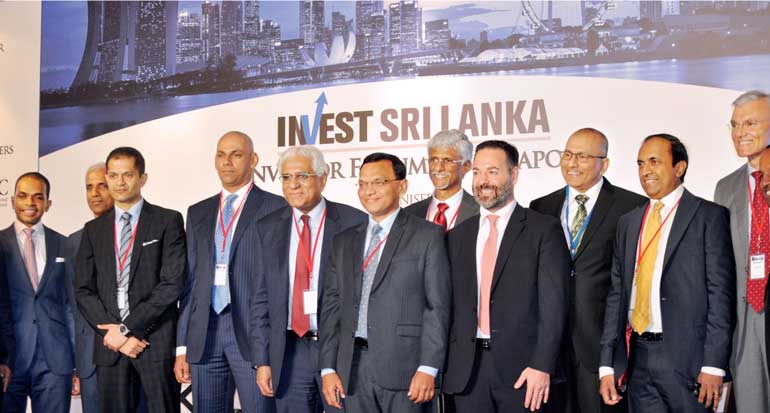
New avenues for collaboration have been initiated and the Singapore-Sri Lanka FTA signed earlier this year has paved the way for a new era of economic and business cooperation, he said.
“We are confident that this new and improved backdrop of cooperation will strengthen economic ties and facilitate greater investment flows between our two nations,” CSE Chief added.
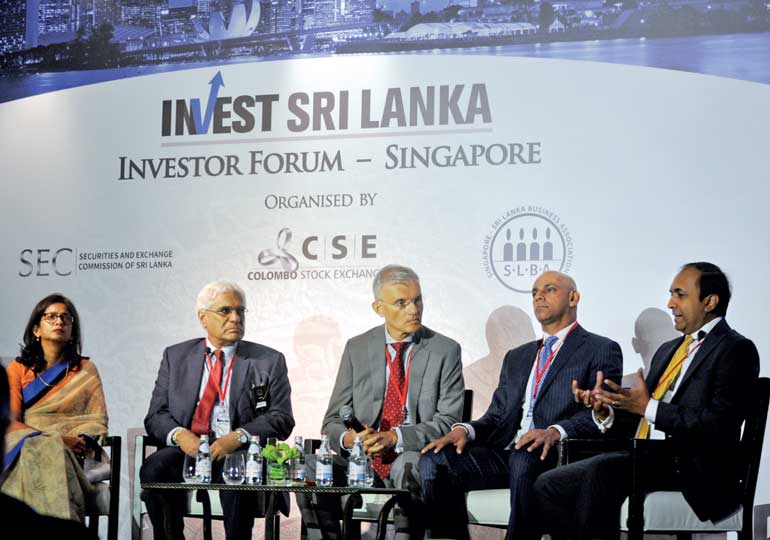
Highlighting the progress of the Colombo stock market, Abeywardena said CSE entered 2018 on the back of a record year of foreign investments into Sri Lanka.
“Foreign investments into the capital markets exceeded Rs. 112 billion in 2017, which is the highest ever recorded in our history, which is a strong endorsement of the value proposition the stock market offers. Sri Lanka is presently perceived as one of the most attractive frontier markets and the proposition is only getting stronger with solid macroeconomic reforms initiated for the country to gain momentum in its economic growth,” CSE Chief emphasised.
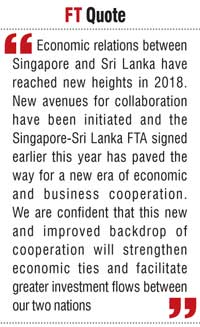
He said that the CSE, with the direction of the Securities and Exchange Commission of Sri Lanka, plays an integral part of this growth trajectory.
“The introduction of a multi-currency board to facilitate listings and trading in foreign currencies, the establishment of a delivery vs. payment framework, introduction of new products such as exchange traded funds, structured warrants, REITS and equity-linked derivative products, will broaden the range of products we offer and will improve our visibility globally. We are also focused on making substantial improvements to market infrastructure and risk management, to diversify and broaden our product range, enhance our governance structure and increase market access,” Abyewardena said. adding that “the CSE is committed to carrying out our tasks in communicating the investment potential that Sri Lanka offers to the world.”
Central Bank Chief says measured and cautious optimism on economy
Central Bank Governor Dr. IndrajitCoomaraswamy in his presentation said the headline message was “there is cause for measured and cautious optimism on the economy. Stabilisation of the economy has been achieved but it is not a euphoria moment and there is no cause for complacency.”
He presented several macroeconomic indicators to prove that the economy was stabilizing, leading the way for an upturn going forward. He highlighted a host of measures put in place during the past two years, especially after the IMF program was initiated and the results are evident.
He said that headline inflation in February was 4.5%, which was well within the target, and core inflation was at 3.5% and the latter has been within the 4-6% target in recent quarters. Headline inflation did reach a peak due to volatile prices over which monetary policy has very limited influence. He said three consecutive cultivation seasons were impact by adverse weather which pushed food price inflation to a high level of 14%. However, now the supply situation has improved which should bring down food price inflation and headline inflation.
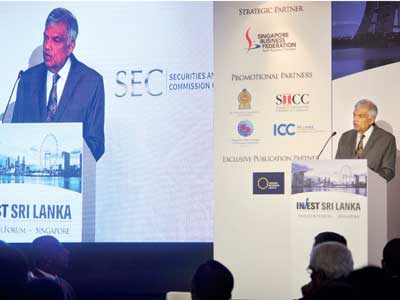
He said monetary policy has had a tight bias over the past 18 months and he expressed hope that there will be room for a loosening. Overall, the balance of payments surplus was $ 2 billion, with external reserves improved to almost $8 billion. The build-up of volume has been buttressed by an improvement in quality, he said, pointing to improved stability on external reserves.
“Stability alone doesn’t win elections so we need to see how one can translate this favourable environment into a higher growth trajectory,” he told the Singapore forum.
In that regard he said there were some positive signs. He stated that last year exports and Foreign Direct Investments and Foreign Institutional Investments into the CSE rose to record levels though from a lower base.
In January the Central Bank-conducted Business Outlook Survey moved to positive territory for the first time after many quarters which means even the domestic sentiment is beginning to improve.
“All these means Sri Lanka is on the cusp of a higher growth and development trajectory,” the CB Chief emphasized, adding that the country needed to sustain the good things it has been doing during the past two years. 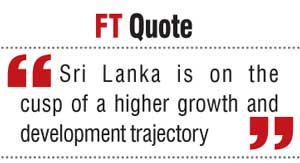
As part of consolidating the effort, the Government has put in place several clear frameworks for macro-economic management.
One is the aggressive revenue enhancement driven fiscal consolidation initiative. For the first time since 1953 there was a primary surplus in the Government Budget last year and for the first time since 1987 we expect a current account surplus in the Budget in 2017. These are structural problems that were there for many years with reckless fiscal spending and are being resolved.
“If the Government is able to persist with the progress made so far in fiscal consolidation, we will have a new era for the Sri Lankan economy with strong macroeconomic fundamentals,” Dr. Coomaraswamy said.
The Central Bank is also encouraging the Government to give teeth to the Fiscal Responsibility Management Act which sets overall targets on the Budget deficit and public debt to GDP.
On the monetary policy side, the Central Bank will be introducing a flexible inflation targeting regime and amending the Monetary Law Act and moving towards a more data-driven forward-looking monetary policy and market-oriented exchange rate policy and rules-based and transparent macroeconomic policymaking. The other is the proactive and prudent debt management given the high debt to GDP ratio with the Active (Debt) Liability Management Act.
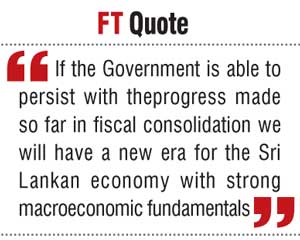
He also detailed the Government’s trade tariff reforms, trade facilitation and expansion initiatives with planned FTAs and agreements to enhance economic cooperation, thereby harnessing the full potential of a strategic location to plug into the Asian supply chain. “Sri Lanka will be the only country in the world with preferential trade access to India, China and the Europe,” the CB Chief added.
Singapore’s decision to enter into FTA with Sri Lanka reflects the Singapore Government’s confidence in Sri Lanka and its future - High Commissioner Weeraratne
Sri Lanka’s High Commissioner in Singapore NimalWeeraratne said the forum was important to further the strong bilateral ties between Sri Lanka and Singapore and the timing was ideal, especially after the signing of the FTA between the two countries.
“Singapore’s decision to enter into an FTA with Sri Lanka reflects the Singapore Government’s confidence in Sri Lanka and its future,” he said. Weeraratne also expressed confidence that the forum would result in many positive takeaways for both Singapore and Sri Lanka and their business communities, and open opportunities to further their engagements.
The Invest Sri Lanka Forum in Singapore was supported by a host of organisations. DBS Private Bank Singapore, Capital Alliance Partners, Wilmar International Ltd andBP de Silva Holdings as Platinum Sponsors. Acuity Partners, Asia Securities, Ceylon Guardian and CT CLSA Securities as Gold Sponsors.The Dwellings Group as Bronze Sponsorand the Oxford Business Group as the Exclusive Publication Partner. The Sri Lankan High Commission in Singapore, the Singapore International Chamber of Commerce, the Singapore Indian Chamber of Commerce and International Chamber of Commerce Sri Lanka were Promotional Partners of the initiative.
